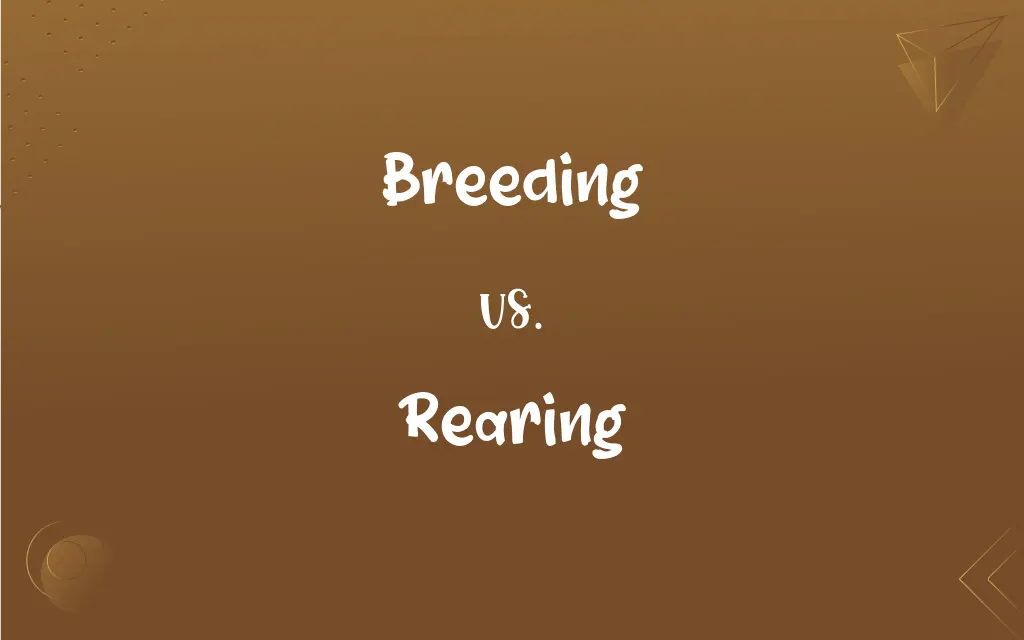Breeding vs. Rearing: What's the Difference?
By Aimie Carlson || Updated on May 22, 2024
Breeding involves the controlled reproduction of animals or plants to achieve specific traits, while rearing refers to the care and upbringing of young animals or children.

Key Differences
Breeding is a process focused on the controlled reproduction of animals or plants, typically to enhance or propagate specific traits or characteristics. This practice is common in agriculture, animal husbandry, and horticulture, where desired genetic traits such as higher yield, disease resistance, or particular physical characteristics are prioritized. Rearing, on the other hand, pertains to the care, upbringing, and nurturing of young animals or children. This process includes feeding, protecting, educating, and ensuring the overall well-being and development of the offspring.
Breeding aims to manipulate genetic outcomes to achieve specific goals, whereas rearing is about providing care and support to ensure healthy growth. Both practices are integral to the life cycle of animals and plants but serve different purposes and involve distinct processes.
Breeding is often a scientific and selective process, while rearing is more about practical day-to-day care and nurturing. Breeding decisions can impact the genetic makeup and future generations, while rearing influences the immediate development and behavior of the offspring.
Comparison Chart
Definition
Controlled reproduction for specific traits
Care and upbringing of young animals or children
Main Purpose
Enhance or propagate desirable traits
Ensure healthy growth and development
ADVERTISEMENT
Common Context
Agriculture, animal husbandry, horticulture
Animal husbandry, child care, education
Focus
Genetic manipulation
Practical care and nurturing
Impact
Genetic outcomes for future generations
Immediate development and behavior
Breeding and Rearing Definitions
Breeding
The science of genetics applied to reproduction.
Breeding programs aim to develop disease-resistant crops.
Rearing
The act of raising and caring for young animals or children.
Rearing puppies involves feeding, training, and socializing them.
ADVERTISEMENT
Breeding
Managing reproduction in controlled environments.
Aquarium breeding involves maintaining ideal conditions for fish.
Rearing
Ensuring the growth and development of the young.
The farmer invested time in rearing calves to ensure healthy cattle.
Breeding
The process of mating animals or plants to produce specific traits.
The farmer focused on breeding cattle for higher milk production.
Rearing
Providing necessary support and education.
Rearing children includes education, moral guidance, and support.
Breeding
Selective reproduction to enhance desirable characteristics.
Breeding roses for color and fragrance requires careful selection.
Rearing
Nurturing young organisms until maturity.
Successful rearing of chicks requires a warm and safe environment.
Breeding
Propagation of species through selective mating.
Breeding thoroughbred horses ensures desirable racing qualities.
Rearing
Managing the daily needs and well-being of the young.
Rearing kittens includes regular feeding and veterinary care.
Breeding
One's line of descent; ancestry
A person of noble breeding.
Rearing
To care for (children or a child) during the early stages of life; bring up. See Usage Note at raise.
Breeding
Upbringing or education, especially in proper social behavior.
Rearing
To tend (growing plants or animals).
Breeding
The production of offspring or young
Measures to control the breeding of mosquitoes.
Rearing
To build; erect.
Breeding
The propagation of animals or plants
A farm devoted to the breeding of horses.
Rearing
(Archaic) To lift upright; raise.
Breeding
Propagation of offspring through sexual reproduction.
Rearing
To rise on the hind legs, as a horse.
Breeding
The act of insemination by natural or artificial means.
Rearing
To rise high in the air; tower.
Breeding
The act of copulation in animals.
Rearing
Present participle of rear
Breeding
The good manners regarded as characteristic of the aristocracy and conferred by heredity.
Rearing
Act of raising young.
We studied blowfly rearings in various environmental conditions.
Breeding
Nurture; education; formation of manners.
Rearing
The properties acquired as a consequence of the way you were treated as a child
Breeding
Descent; pedigree; extraction.
Your dog has good breeding.
Rearing
Raising someone to be an accepted member of the community;
They debated whether nature or nurture was more important
Breeding
(gay slang) Ejaculation inside the rectum during bareback anal sex.
Rearing
Rearing on left hind leg with forelegs elevated and head usually in profile;
A lion rampant
Breeding
Of, relating to or used for breeding.
Your toothbrush is a breeding ground for bacteria.
Breeding
Present participle of breed
Through genetic manipulation and harsh training, I am breeding a species of super-dogs to take over the world.
Breeding
The act or process of generating or bearing.
Breeding
The raising or improving of any kind of domestic animals; as, farmers should pay attention to breeding.
Breeding
Nurture; education; formation of manners.
She had her breeding at my father's charge.
Breeding
Deportment or behavior in the external offices and decorums of social life; manners; knowledge of, or training in, the ceremonies, or polite observances of society.
Delicacy of breeding, or that polite deference and respect which civility obliges us either to express or counterfeit towards the persons with whom we converse.
Breeding
Descent; pedigree; extraction.
Honest gentlemen, I know not your breeding.
Breeding
Elegance by virtue of fineness of manner and expression
Breeding
The result of good upbringing (especially knowledge of correct social behavior);
A woman of breeding and refinement
Breeding
Raising someone to be an accepted member of the community;
They debated whether nature or nurture was more important
Breeding
The production of animals or plants by inbreeding or hybridization
Breeding
The sexual activity of conceiving and bearing offspring
Breeding
Producing offspring or set aside especially for producing offspring;
The breeding population
Retained a few bulls for breeding purposes
FAQs
Why is breeding important in agriculture?
Breeding is important to develop crops and livestock with desirable traits such as higher yield or disease resistance.
What are common practices in rearing?
Common practices include feeding, sheltering, educating, and ensuring the health of the young.
What does rearing involve?
Rearing involves the care, upbringing, and nurturing of young animals or children.
What are the goals of rearing in animal husbandry?
The goals include ensuring the animals grow healthily, develop properly, and are well-adjusted.
Can breeding be applied to plants?
Yes, breeding can be applied to plants to develop desired characteristics like better fruit quality or pest resistance.
How does breeding affect future generations?
Breeding can alter the genetic makeup of future generations by emphasizing specific traits.
How does rearing impact behavior?
Rearing impacts behavior through training, socialization, and the provision of a stable environment.
What is breeding?
Breeding is the controlled reproduction of animals or plants to enhance specific traits.
Is rearing limited to animals?
No, rearing also applies to raising children and ensuring their development and education.
What are essential elements of successful rearing?
Essential elements include proper nutrition, safety, education, and emotional support.
What is genetic manipulation in breeding?
Genetic manipulation involves selectively breeding organisms to enhance or introduce specific traits.
What challenges are involved in rearing?
Challenges include providing adequate nutrition, healthcare, training, and creating a supportive environment.
What is a breeding program?
A breeding program is an organized effort to mate animals or plants in a way that enhances specific traits.
Why is nurturing important in rearing?
Nurturing is important because it supports the physical, emotional, and social development of the young.
What is selective breeding?
Selective breeding involves choosing parent organisms with specific traits to produce offspring with those traits.
What is the difference between breeding and natural reproduction?
Breeding is a controlled process aimed at specific outcomes, whereas natural reproduction occurs without human intervention.
How do breeders select parent organisms?
Breeders select parent organisms based on desired traits and genetic compatibility.
Can rearing practices vary by species?
Yes, rearing practices vary significantly depending on the species and their specific needs.
What role does education play in rearing?
Education is crucial in rearing as it helps in the cognitive and social development of the young.
Is breeding limited to animals?
No, breeding also applies to plants and involves the same principles of selective reproduction.
About Author
Written by
Aimie CarlsonAimie Carlson, holding a master's degree in English literature, is a fervent English language enthusiast. She lends her writing talents to Difference Wiki, a prominent website that specializes in comparisons, offering readers insightful analyses that both captivate and inform.
































































